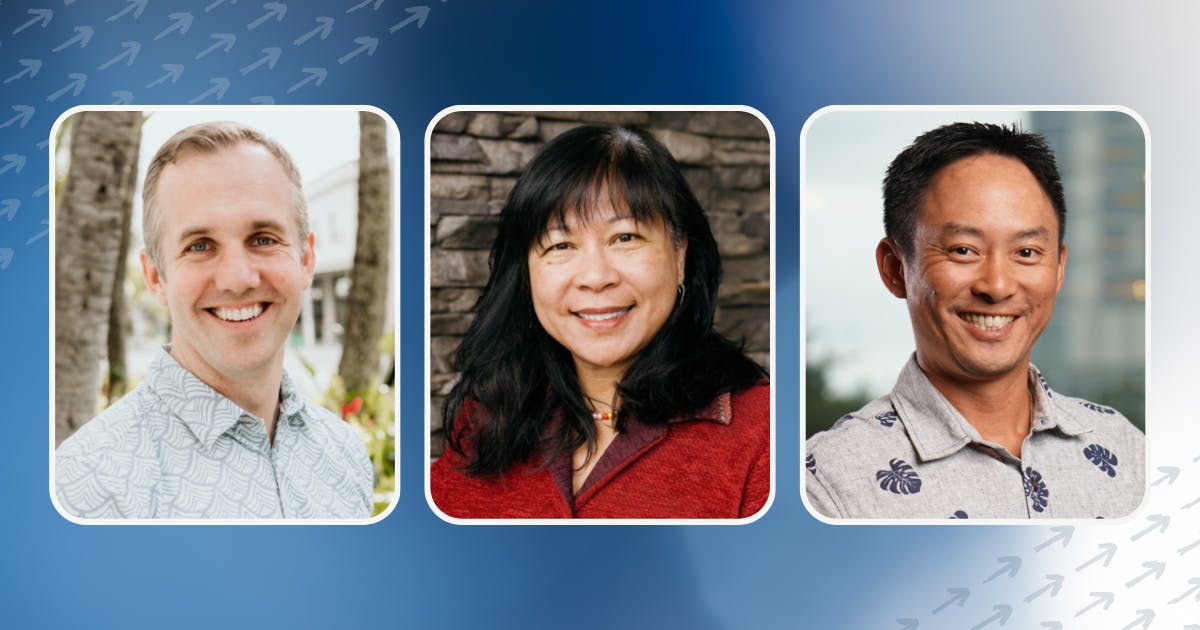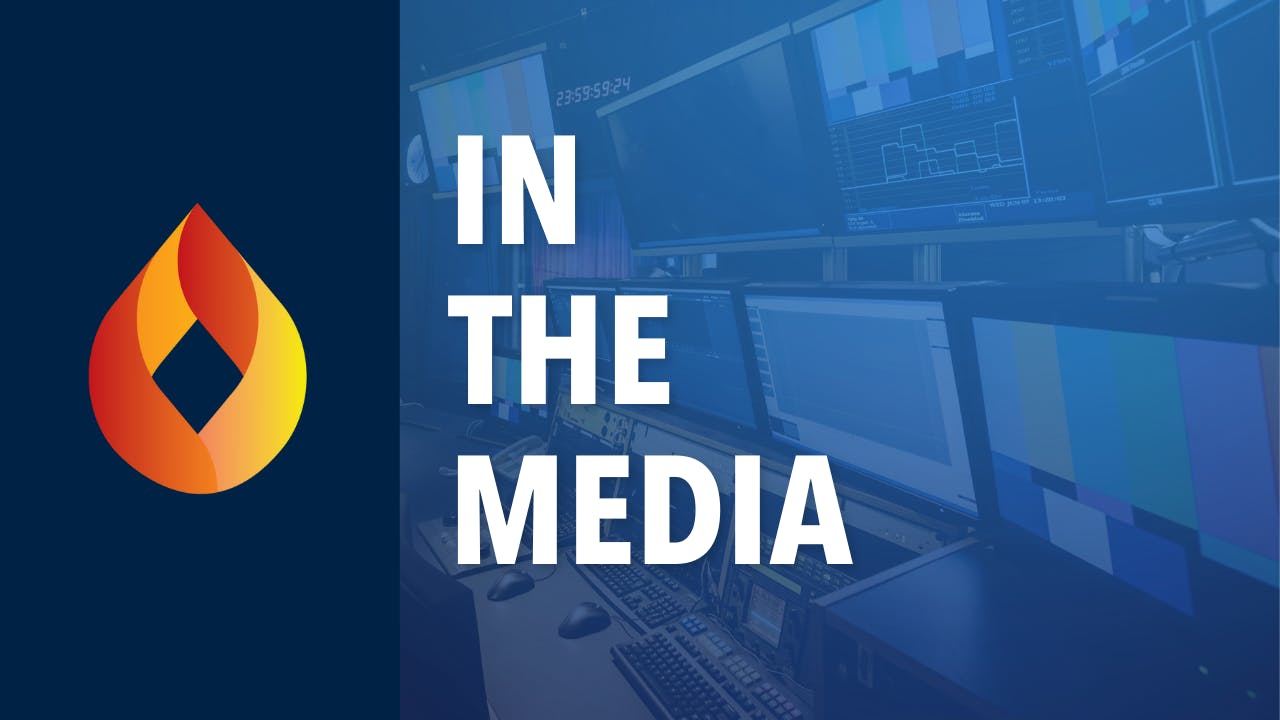
Omidyar Fellows Gavin Thornton, Rachel Solemsaas, and Chris Lee
We asked Fellows about their leadership transition experiences. Here’s what they had to share.
Some responses have been edited for length and/or clarity.
Gavin Thornton, Hawai‘i Appleseed Center for Law and Economic Justice
Share a transition experience you are a part of and what helped to make it positive and successful.
I’m in the process of leaving my current role as executive director of Hawaiʻi Appleseed, an organization working to advance economic justice.
As Appleseed’s first staff member 20 years ago, I long felt like my destiny and Appleseed’s were inextricably intertwined. But some years ago, I realized there would come a stage in the organization’s evolution when it would benefit from a new executive director, one with a different background, perspective, and set of talents. Earlier this year I came to a clear understanding that the time is now.
In the world of public policy, so much of what we do is driven by evidence, research, analysis, and reason. So it’s not surprising that in deciding whether now is the right time for a leadership transition, I’d turn to the data. The data says:
- We have the right staff, board, partners and supporters to carry forward the work.
- We have more clarity of purpose and better systems than ever.
- We have a solid financial cushion to absorb any bumps a transition might cause.
While data’s voice resonates with me, there are other voices speaking:
- Fear says: Maybe there’s no one else who will take on this role.
- Ego goads: What if no one else can do this job as well?
- Guilt suggests: You’re abandoning the mission and the people who rely on you.
- Comfort argues: You know this work; something new will be riskier and harder.
- Doubt taunts: What if you don’t find another opportunity to contribute at this level?
I’ve always yearned for data and reason to reveal “the right answer.” But when it comes to decisions of complexity involving people and society, data and reason alone rarely provide a loud, clear, and definitive answer. For that, we need to learn to rely on a still, small voice that is quieter, yet more powerful than all the others. Some call this intuition, but intuition feels too closely tied to instinct and self-preservation. I’m contemplating something more soulful and transcendent—something that speaks from the vastness of the universe and the interconnectedness of all life. For me, this voice is tied to my religion, though it need not be for others.
I’m not suggesting we abandon reason and make decisions by a Magic Eight Ball. After we’ve examined the facts, talked it through, dissected, tested, and analyzed, then we should listen for a voice that operates on the level of love, compassion, relationship, and purpose—the things that matter most, though they’re nearly impossible to quantify.
Perhaps because our society values measurement and scientific rigor, we tend to discount the importance of a spiritual voice in our personal decisions, and especially in decisions of societal import. I am inspired by leaders—often religious or indigenous leaders–who pay attention to this voice and allow it to guide their actions. We’d benefit from more leaders who breathe life, light, and love into cold, calculated decision-making.
Right now, this voice whispers to me that stepping aside creates space for fresh energy and new ideas to take root. It tells me that leadership is not about clinging to a position, but about knowing when to move forward and let others lead. And while the other voices speak of uncertainty and loss, this voice reassures me that the organization I’ve helped nurture will thrive in ways I cannot yet imagine.
Listening to this voice isn’t about having all the answers, but about trusting the path forward—even when it’s unclear. It’s about embracing the unknown with a sense of possibility for what the next chapter will bring.
Rachel Solemsaas, North Seattle College
What advice would you give someone going through a transition?
The quote by Jimmy Dean, “I can't change the direction of the wind, but I can adjust my sails to always reach my destination,” is a powerful metaphor for adaptability and resilience in the face of opportunities and challenges. It encapsulates the idea that while we cannot control external forces or circumstances, we do have the power to control how we respond to them.
In today’s fast-paced and unpredictable world, adapting and thriving amid change is a hallmark of effective leadership. As a Fellow, leader, and change maker, I embrace the fact that leadership transition is essential to my being. I have come to accept that things rarely go exactly as planned. We may face unexpected difficulties, shifts in circumstances, or other challenges that disrupt our course. However, the key to success lies not in resisting these changes but in adjusting our approach to them.
My recent departure from Hawaiʻi Community College to continue my life’s work at North Seattle College represented another journey of change. This journey offered growth and learning despite moments of uncertainty and fear. It also reminded me of my blessing: a vast support network to carry me through.
They include support and guidance from family, friends, and colleagues. Further support is instilled by being part of the Omidyar Fellows, starting with the unconditional aloha offered by my cohort, with their gift of time and sage advice. One Fellow even referred me to a job opportunity. I also had the support of my leadership coach who instilled conscious leadership approaches to managing my feelings above the line and reminding me that I have the capacity to control my destiny.
Finally, I am honored to be part of the first HLF Transition Cohort. Under our executive coach’s guidance, we ventured through “Managing Oneself” with a deeper dive into who we are through the Birkman Method, sense-making of our journey with the Renewal Cycle and Change Cycle, and guidance with resilience life skills.
Jimmy Dean’s quote is a timeless reminder of the power of adaptability and perseverance. It teaches us that while we may not control every aspect of our lives, we do control our responses. By adjusting our sails—our strategies, attitudes, and actions—we can continue to move forward and reach our destinations regardless of the winds we encounter along the way.
If there is one piece of advice I still hold dearly during this journey, it is the reminder that things are happening for me rather than to me.
Chris Lee, Manson Products
What was a helpful support you received during your leadership transition?
Making a leadership transition is a pivotal time in one’s career. To help me through my most recent transition, I leveraged an executive coach. However, in the past, I’ve turned to a mentor or colleague. Regardless, it was helpful to talk with someone that can be open and honest with you. This is a good opportunity to identify the practices that have contributed to your success, and at the same time, prepare to adapt your approach to meet new challenges. In addition, there are likely habits and behaviors that you will want to leave behind.
What were helpful resources during your leadership transition?
Two great books that I read during my transitions are What Got You Here, Won’t Get You There by Marshall Goldsmith and The First 90 Days by Michael Watkins. Both can help to put you in the right mindset and strategically approach the next phase of your career.
What advice would you give someone going through a transition?
Change is constant and often unpredictable and beyond our control. It can be a gentle nudge or a disruptive force, but it always presents an opportunity for growth and self-discovery. Understanding yourself, your values, and what matters most becomes critical in navigating change effectively. Use a transition as an opportunity to hone your strengths and be willing to refine the things that you want to change about yourself.
Share a transition experience you were a part of and what helped to make it positive and successful.
When we talk about transition, we often focus on what we are going to do as we the transition “into” rather than what we should do “in between.” There are a few things that I have learned from the professional transitions that I have made. First, make time for yourself. Take a break and allow yourself the time to re-center, reflect, and reorganize. Second, have a transition plan for yourself. Identify your needs and resources as you embark on a new journey. Lastly, don’t be afraid to look back. Many say to keep looking forward, but I find that there is a lot to learn from the past. If you are true and honest to yourself, you will know what to keep and what to let go.
Hawai‘i News Now — Visitor industry leaders join "Spotlight Now" as the Hawai‘i Tourism conference gets underway.
